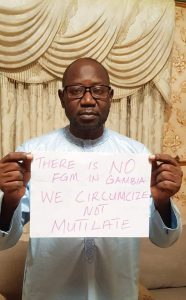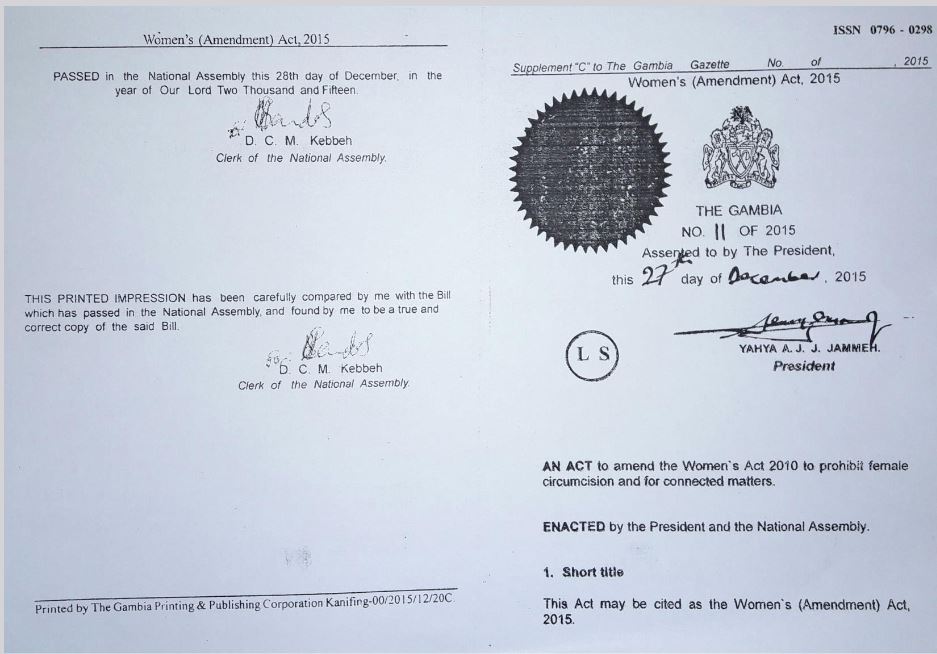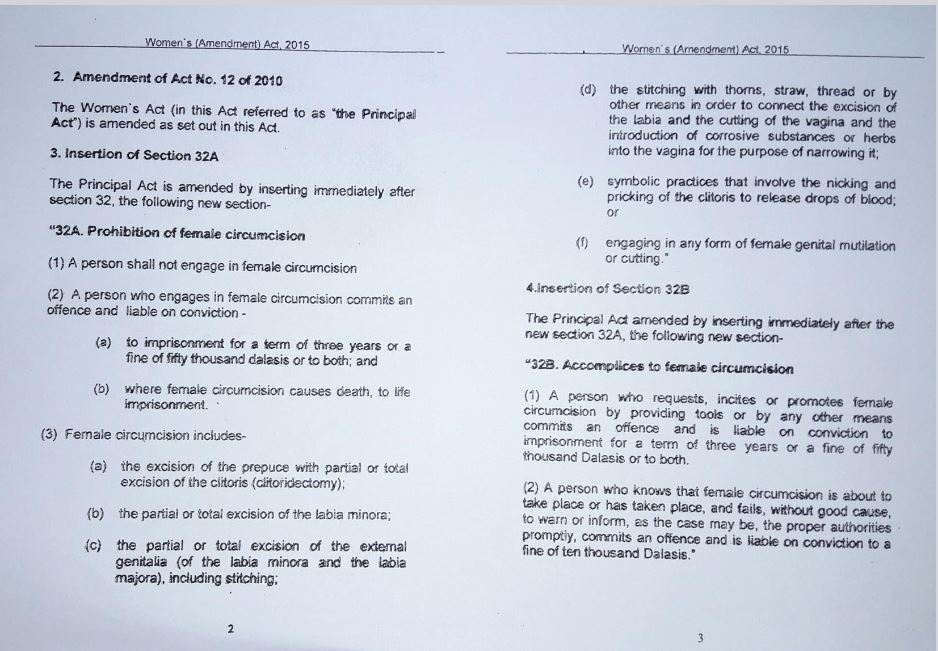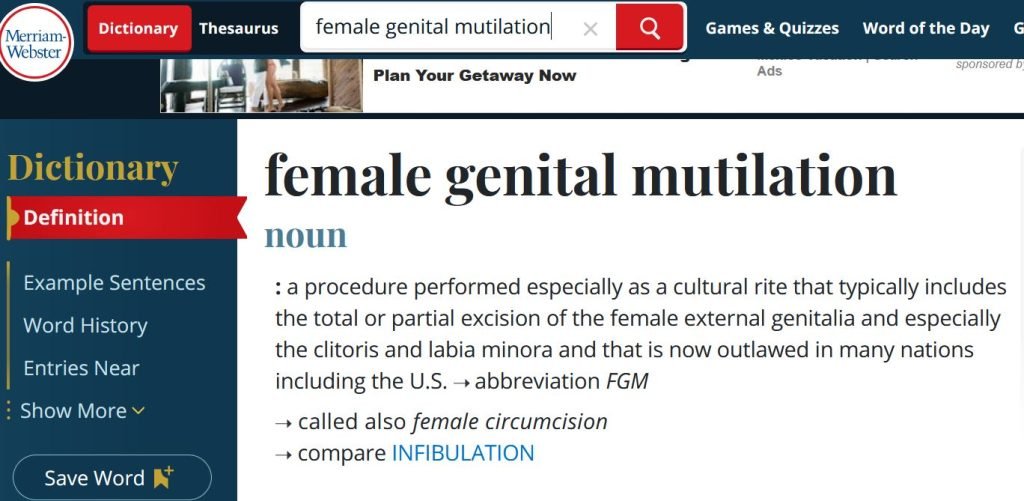By Cherno Omar Bobb

Claim: There is no FGM in Gambia. We circumcize not mutilate.
Source: Mai Ahmad Fatty, politician, leader of Gambia Moral Congress
Verdict: False and Misleading
In August 2023, three women were convicted and fined for carrying out Female Genital Mutilation (FGM) on eight infant girls in the Gambia – becoming the first people convicted under a 2015 law that banned the harmful traditional practice.
The girls were between the ages of one and four years old, and the women were fined D15, 000 (a little over $200) each or in default serve a one-year prison sentence.
The verdict, which angered some religious leaders who paid the fines, was hailed as a landmark feat by local and international agencies leading the campaign to eradicate the harmful practice.
Since then, there has been a campaign to lift the ban in a country that is placed among 10 countries with the highest level of FGM in the world, with 78.3% of women aged between 15 and 49 years undergoing FGM/C, according to the latest Gambia Demographic and Health Survey (2019-20 GDHS) published by the Gambia Bureau of Statistics (GBoS).
The “lift the ban campaign” was subsequently escalated to a policy level with a Draft Women’s (Amendment) Bill, 2024 sponsored by the National Assembly member for Foni Kansala – which seeks to make the practice of FGM/C a “matter of choice” for those who want to practice it.
It would repeal the Women’s (Amendment) Act, 2015 which places a ban on the practice of FGM/C in The Gambia. Sections 32A and 32B criminalized the practice with punishments of imprisonment of up to 3 years and fines of up to $735.6 for performing, procuring, and aiding and abetting the practice of Female Genital Mutilation/Cutting (FGM/C).
Activists opposed to the practice say repealing the law will make Gambia unsafe for women. The proponents, including Muslim leaders, say the practice is sanctioned by Islam – which activists and other muslim leaders within and outside the Gambia have disputed.
The United Nations and African Union agencies and human rights groups have since criticized the move as “retrogressive”.
The Claim
On March 17, less than 24-hours to a vote by the National Assembly to lift the ban, Gambian lawyer and politician, Mai Ahmed Fatty, posted the following on Facebook to his 96, 000 followers: “There is no FGM in Gambia. We circumcize not mutilate.”
Fatty, who posted two photos in which he wore a light blue kaftan and displayed A4 Size papers displaying his message. He also cited Section 25(1)(a)(b) of the Gambian Constitution as protecting “the right to practice religious belief & to manifest it.”
The Assembly subsequently voted 42-4 to advance the Bill to the committee stage.
Fatty’s post generated 1000 likes, 286 comments (for and against his message), and was shared by at least 100 Facebook users.
His message was also relayed by the media here and here and in Facebook groups including the Gambia Youth and Women Forum which has 137, 000 members.
Fact-Check:
The Gambian law, Women’s (Amendment) Act, 2015, does not differentiate between the two. The two terms are used interchangeably in the law. See photo below:


We look at other sources and found that FGM/C is also known by other names such as ‘female circumcision’.
The most updated dictionary, Merriam-Webster, also indicated that FGM is also called Female Circumcision. See photo below:

Our findings suggest that the terms FGM or FGM/C and female circumcision mean one and the same thing and are globally used interchangeably.
In an interview with a leading online platform, Kerr Fatou, published on YouTube on March 14, 2024, Mai Ahmad Fatty said a niece of his who underwent FGM Type III could not consummate the marriage for three weeks because she was sealed. Listen from: 1:23:37 minutes. Fatty also said because he supports FGM doesn’t mean he will practice, and that he has three girls and none of them are circumcised.
To put context in the argument of “circumcision” and “not mutilation”, those who push this idea, including Fatty, the Gambia Supreme Islamic Council, and the National Assembly Member who sponsored the Bill to lift the ban on FGM, largely argue that it is a “lesser form or a more humane form of cutting” the tip of the female genitalia. In any case, and however minor, it involves mutilation or cutting. Their position falls within the practice of Type I FGM.
What are the types of FGM/C or Female Circumcision?
Type I: Excision of the prepuce with or without excision of part or all of the clitoris.
Type II: Excision of the clitoris with partial or total excision of the labia minora.
Type III: Excision of part or all of the external genitalia and stitching or narrowing of the vaginal opening (infibulation).
Type IV: Other forms, including pricking, piercing, or incising of the clitoris and/or labia; stretching of the clitoris and/or labia; cauterization by burning of the clitoris and surrounding tissue; scraping of tissue surrounding the opening of the vagina (angurya cuts) or cutting of the vagina (gishiri cuts); and introduction of corrosive substances or herbs into the vagina to cause bleeding or to tighten or narrow the vagina.
Conclusion
Based on our findings, we can conclude that there is no difference between FGM or FGM/C and Female Circumcision and the terms are used interchangeably.
FGM practice is widespread in The Gambia and Type I and Type II are known to be the most common in the Gambia and they all involve mutilation/cutting.
Type III (commonly referred to as infibulation) is practiced among only a small percentage of women and girls. Type IV (described in The Gambia as vaginal sealing) is also practiced.
These practices are rooted in tradition and custom and cross ethnic, religious and cultural boundaries.
Therefore, Mai Ahmad Fatty’s claim that “There is no FGM in The Gambia” is FALSE, and his claim that “we circumcize not mutilate” is MISLEADING.
- Additional research by Modou S. Joof


